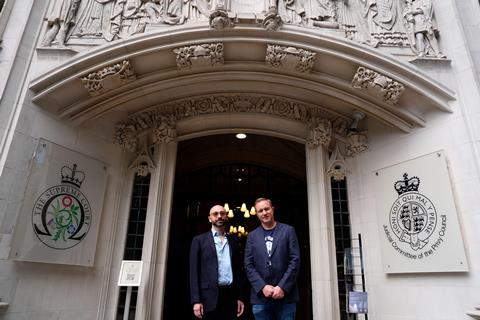Calls for a public inquiry and for the rights of the Serious Fraud Office to prosecute individuals to be removed have been made by defence solicitor Karen Todner whose client, former City trader Tom Hayes, had his conviction quashed after the Supreme Court found his trial judge’s directions to the jury were ‘inaccurate and unfair’.
Yesterday’s judgment has also raised ‘serious questions’ over jury-less trials in complex financial cases, lawyers said.
Hayes’ and former trader Carlo Palombo’s convictions were referred to the Court of Appeal by the Criminal Cases Review Commission in 2023. The CoA dismissed the appeals but certified that its decision involved a point of law of general public importance relating to the proper definition of the London Inter-Bank Offered Rate (LIBOR) and Euro Interbank Offered Rate (EURIBOR). LIBOR, which was phased out in 2023, and EURIBOR are benchmark interest rates for short-term loans between banks. The IBOR rates were calculated daily from submissions by a panel of major banks.

Hayes, 45, a former securities trader at UBS and Citigroup, was convicted in 2015 of multiple charges of conspiracy to defraud in relation to manipulations of the LIBOR. He was sentenced to 14 years’ imprisonment, later reduced to 11 years. Palombo, 46, was convicted of conspiracy to defraud by rigging the EURIBOR benchmark interest rate between 2005 and 2009. He was sentenced to four years’ imprisonment in 2019.
Quashing Hayes’ conviction, the Supreme Court said: ‘It is not possible to say that, if the jury had been properly directed, they would have been bound to return verdicts of guilty. The convictions are therefore unsafe and cannot stand.’
Palombo’s conviction was also quashed. The judgment said: ‘When the flaws in the directions given at Mr Palombo’s trial are considered in combination, it cannot safely be assumed that, without them, the jury would still have been bound to convict Mr Palombo. Thus, his conviction also cannot stand.’
Following the judgment, Todner said: ‘Mr Justice Cooke presided over an unfair trial and for that he must take responsibility. The case highlights numerous problems with our criminal justice system, all of which I believe meet the criteria for a public inquiry. Tom was charged on an indictment containing conspiracy to defraud contrary to common law. This charge has caused many miscarriages of justice because it is hopelessly vague.'
Read more
Todner also attacked the practice of private prosecutions. 'The only body who should be bringing criminal prosecutions in the United Kingdom is the Crown Prosecution Service,' she said. 'The dual role of the SFO as investigator and prosecutor creates a substantial conflict of interest which creates miscarriages of justice.’
Jonathan Fisher KC, barrister at Red Lion Chambers, said: ‘The Supreme Court makes clear that the failure in this case stemmed from judicial error - specifically, the misdirection of the jury by treating as a matter of law something that is actually a matter of fact - but this does not exonerate the SFO completely [which was] criticised…for not making clear the precise nature of its case from the outset.’
Robert Newcombe, barrister at Church Court Chambers, said: ‘The UK Supreme Court has issued a stark reminder to judges in criminal trials that matters of fact are for the jury to decide. The judgment does raise serious questions as to whether a judge sitting alone is a suitable tribunal to try a fraud case in place of a properly directed jury.’
Charles Kuhn, partner at international firm Clyde & Co, said the judgment raised ‘serious questions about the SFO’s decision-making in pursuing complex and nebulous cases’. He added: ‘The recent recommendations from Lord Levenson, to bring the criminal justice system back from the brink of collapse, which include single judge trials for serious and complex fraud cases, is undermined by today’s decision. The Supreme Court has been highly critical of the way the judges handled the LIBOR case, showing that relying on a single judge in difficult cases may not be appropriate. Instead, a panel of judges, or judges with experts, Levesons other option, should be explored.’
The SFO said it would not be seeking a retrial of Hayes or Palombo.
This article is now closed for comment.





























7 Readers' comments